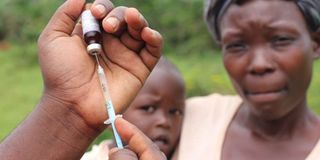Kenya risks a measles outbreak, warns expert

A child about to be vaccinated against measles and rubella in Kabondo Kasipul, Homa Bay County. Concerns have been raised about the declining levels of immunisation. File | Nation Media Group
As one deadly disease spreads throughout the world, immunisation, especially among children, continues to decline by close to 30 per cent, data has shown.
The risk of outbreaks of vaccine-preventable diseases continues to grow.
Paediatric and infectious disease specialist Dr Christine Chege said the drop in immunisation coverage was likely to mostly affect measles because it was highly infectious and the coverage needed to achieve herd immunity was over 90 per cent.
“During the 2017 strike, we saw pockets of measles outbreak in the country and a longer interruption of vaccine programmes will reveal more. As Covid-19 has taken hold, it has been vital that immunisation efforts against measles continue,” she said.
“The five month long nurses’ strike in 2017 cut the national immunisation coverage to a 15-year low of 63 per cent, exposing children below one year to diseases such as polio, pneumonia and tuberculosis. It is hard to imagine what this global pandemic can do to the immunisation coverage,” said the Kenyatta University lecturer.
Experts are sounding the alarm over the increased number of mothers who have not taken their children for vaccination for fear of contracting Covid-19 in hospital.
PPE availability
According to the World Health Organization, in 2020 alone, 80 million children under one year live in a country that has reported some kind of disturbance to the immunisation programme largely due to limited access to health centres, low availability of PPEs for healthcare workers and fear of contracting Covid-19.
They said since many health services were being scaled back, the risk of further outbreaks of infectious diseases is high.
Dr Chege urged parents to take their children for vaccinations as there were strategies in place to mitigate the spread of the coronavirus. “Initially the messaging was not very good because people were asked to stay away from hospitals and mothers, especially, kept their children as far as possible from hospitals. Now, there needs to be more public education to assure them that immunisation services are being carried out in a separate side of the hospital and that there are hygiene stations for the patients,” she said. “They also need to understand that social distancing and wearing of masks properly can help curb the spread of the virus.



